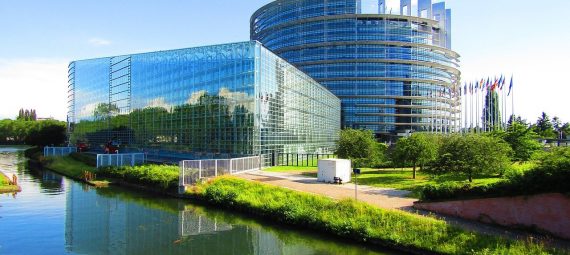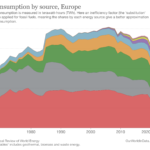Johannes Eber – Good morning Europe blog
A certain topic pops up in the news at regular intervals. That is the EU presidency. Mostly it is on the news when the presidency changes (it does every six months). Like now, when France took over from Slovenia at the beginning of this year (and got most of the attention for removing an EU flag from the Arc de Triomphe after causing a stir). But what actually happens in the meantime? Does the EU presidency matter for the European Union?
So today’s question is, how important is the presidency for the European Union?
First of all, what is the EU presidency (correctly, it is called the presidency of the Council of the European Union) about anyway?
Generally speaking, the EU presidency is responsible for the functioning of the Council of the European Union (where national ministers come together; don’t mix it up with the European Council where the heads of governments meet).
Although it is called “presidency”, the position is not held by an individual but by a national government. The presidency’s function is to chair council meetings, determine its agendas, set a work programme and facilitate dialogue both at Council meetings and with other EU institutions.
Because many topics have longer lifetimes than the six months of the presidential cycle, the three successive presidencies build a presidency trio. They cooperate on a “triple-shared presidency” over an 18-month period to accomplish a common agenda by the current president simply continuing the work of the previous “lead-president” after the end of its term. The current trio (2022-2023) is made up of France (January to June 2022), the Czech Republic (July to December 2022) and Sweden (January to July 2023).
Enough of theory. What is France planning to do in its current EU presidency? President Emanuel Macron encapsulated his priorities for France’s presidency of the EU with the motto: “Recovery, power, belonging”.
Here are main topics of Macron’s agenda:
- Among France’s proposals is setting up an emergency reaction capability to help EU states facing crises at their borders.
- Progress on the bloc’s joint defence capability is also critical for ensuring the EU’s sovereignty, Macron said in December when he unveiled his plans for France’s presidency.
- At that event, Macron also pledged to work towards an unprecedented regulation of social media platforms that shall establish liability for hate-filled content.
- Macron also wants the EU to reconsider its strict budget deficit rules as governments spend heavily to save their economies from the impact of Covid-19 restrictions.
- Regarding environmental issues, France wants to propose a new EU mechanism to prevent imports of agricultural products from deforested areas. “We will also advance negotiations on the creation of a European instrument to fight against imported deforestation, which will aim to ban imports to the European Union of soya, beef, palm oil, cocoa and coffee when they have contributed to deforestation,” Macron said.
Douglas Herbert, a France 24 International Affairs Commentator, summarises the ambitious agenda in the video: https://youtu.be/6obEeizDfIQ
Will France be able to implement its proposals and ideas? You can’t know.
The country that holds office can set the agenda, but it can’t push it through.
Furthermore, the Lisbon treaty (in force since 2009) reduced the importance of the presidency significantly for several reasons:
- It strengthened the power of the Council of the European Union and created the position of the president of the European Council (currently Charles Michel).
- It split the foreign affairs council configuration from the general affairs configuration and created the position of High Representative of the Union for Foreign Affairs and Security Policy, combining it with a vice presidency of the European Commission (currently Josep Borrell Fontelles). This high representative is chairing the meetings of EU foreign ministers. So far, the Lisbon treaty created an exception to the rule that the chair of meetings of the Council of Ministers in their various sectoral alignments (like trade, agriculture, environment, telecoms) is occupied by the minister from the country holding the presidency of the Council.
- The eurozone finance ministers have their own permanent chairman — the president of the Eurogroup (currently Paschal Donohoe). The meetings of the finance ministers of all 27 EU countries (known as Ecofin) are still chaired by the country holding the Council presidency, though, in practice, the Eurogroup largely determines the Ecofin’s agenda and decisions.
Confused? Understandable. The list of the various institutions shows that the power of the EU presidency is limited. And of course, France needs the support of other EU member states. But not from all of them. Other than in the European Council with its unanimity principle, most decisions of the Council of the European Union are made by qualified majority voting – a weighted voting system based on the populations of member states.
But that isn’t of that much help, since the Council of the European Union with their regular EU summits provide the guidelines. The rotating presidency is charged with fulfilling the tasks set by those summits.
So the agenda-setting is still top-down and centralized. But I can imagine that the more important an EU presidency country is, the more influential the presidency can be.
As for me, I’ll keep count, how often the term “EU presidency” will pop up in the news during the next six months.
Author Profile

-
Founder of the "Good morning Europe blog" and Pixel economist
Guest author for European Liberals for Reform
Johannes' articles are originally written for the “Good morning Europe” blog (www.goodmorningeurope.org) and the Pixel economist (https://thepixeleconomist.substack.com).
We were given permission to publish his articles on the European Liberals for Reform blog.
Latest entries
Post Disclaimer
The opinions expressed by the author of this post do not necessarily represent the opinions and policies of ELfR.




